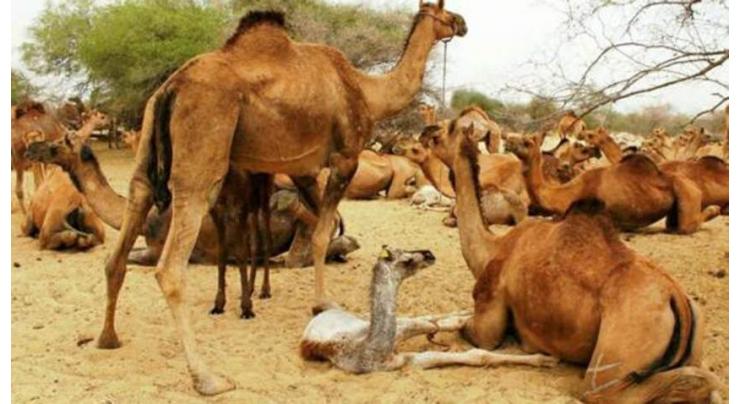
Adoption Of Camel Milk Can Reduce Malnutrition Ratio: Experts
Sumaira FH Published June 25, 2019 | 08:21 PM

Adoption of camel milk can reduce malnutrition ratio, which is affecting 50 per cent of population in the country as its nutrient value is better than cow milk
This was stated by the experts at national camel conference, arranged by Department of Anatomy, University of Agriculture Faisalabad, and Department of Livestock and Dairy Development at New Senate Hall UAF here on Tuesday.
Chairing the session, UAF Vice Chancellor Dr Muhammad Ashraf said that camel milk contains more iron, three times higher vitamin-C than cow's milk in addition to more vitamins, minerals and low fat with high medical value.
He said that in Pakistan, the camel milk share is negligible. He said that camel milk also strengthens immunity system and it was having high medical values. He said that camel was able to produce milk, meat, and wool in harsh conditions with a high value for producers and consumers.
He said that the country's camel breeds were one of best breeds and called for taking steps to preserve the breeds. He said that demand for camel milk was increasing worldwide due to its characteristic. He said that even in China, every mart was offering camel milk for its consumers.
He said that camel was having heat and drought tolerant genes that may be transferred to prone that environment. He said that according to a FAO report, it is found that cereal crops in our country were having zinc deficiency.
Former Vice Chancellor University of Veterinary and Animal Sciences Dr Muhammad Nawaz said that after the age of 40, people must use camel milk for a healthy life. He said that Pakistani camel was having highest milk producing in the region so that with its value addition and branding, we can earn.
Talking about characteristics of camel, he said that long eyelashes protect eyes from blowing sand. He said that camels store fat in their hump. If they cannot find food, camels use this fat to produce energy.
He said that camels have thick lips so they can eat the prickly desert plants without being injured. He said that camel's ears were covered with hair, even inside. The hair helps keep out sand or dust.
Dean Faculty of Veterinary Science Dr Zafar Iqbal Qureshi said that 60 per cent of our potations was living the below the poverty line. He said that agriculture and livestock sector was a way forwards to alleviate the poverty. He showed his concern that camel production for the last 15 years is stagnant that need attentions of farmers, scientists, experts and policy makers.
Dr Muhammad Younus, Member Punjab Agriculture Research board, said that Pakistan produces 59-billion-litre milk and 4th largest milk-producing in the world. He added that per capita milk availability is 165 liters per annum. He said that our Brela milk breed produces 10 to 15 liter milk per day.
Chairman Anatomy Dr Anas Sarwar Qureshi said that the global productions is estimated as 35 million head whereas Pakistan possess about one million camels including double humped camels. The camel rearing is expanding in the world.
PLDD Department Faisalabad Director Dr Saleha Gull, Deputy Director PLDD Abdul Majid, Dr Mazhar Iqbal from Riphah University, all deputy directors of PLDD, Dr Khalid Shouq and other notables also attended.
Related Topics
Recent Stories

LHC suspends PML-N Rana Arshad’s victory notification from PP-133

Faizabad Dharna Commission exonerates former Spy Chief Faiz Hameed

Pakistan calls for enhanced information integrity on digital platforms

Pakistan starts discussion with IMF about new loan agreement: Finance Minister

Currency Rate In Pakistan - Dollar, Euro, Pound, Riyal Rates On 16 April 2024

Today Gold Rate in Pakistan 16 April 2024

Govt hikes petrol price by Rs4.53 per litre for next fortnight

British Investment Group, One Homes, Expected to launch second development at Ce ..

Pakistan Army continues rescue operations in rain-affected areas

"China Ready to Strengthen Counter-Terrorism Cooperation with Pakistan: Envoy"

Why multi-millionaires should live in the cheap countries?

IMF recommends Pakistan to tax non-essential items including cigarettes
More Stories From Health
-

ATC dismisses bail petition of doctor involved in illegal kidneys transplant
7 days ago -

Dr. Shehzad warns against deviation from WHO guidelines on anti-smoking
7 days ago -

Health activists express concerns over attempts to derail tobacco control
9 days ago -

UHS declares MBBS first prof, MS urology exam results
18 days ago -

Increased diagnostic testing for drug resistance
24 days ago -

IRD releases groundbreaking results of end TB programme
26 days ago
-

Increased diagnostic testing for drug resistance TB will enhance patients’ treatment outcome
29 days ago -

JRF to provide insulin to underprivileged diabetic patients
1 month ago -

MBBS third professional annual exams 2023: check results here
1 month ago -

CM Maryam visits PIC, inquiries after patients
1 month ago -

Health expert recommends exercise for weight loss in Ramazan
1 month ago -

Blood camp held at SNGPL office
1 month ago











